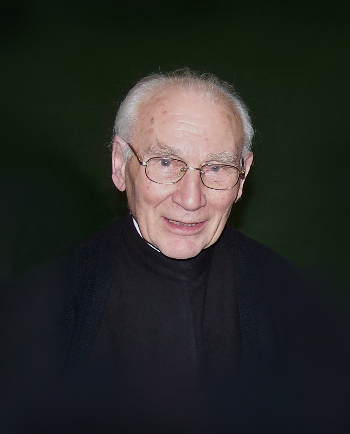
Tadeusz Tomasz Ślipko – a Polish Jesuit, an ethicist. He was born on 18 January 1918 in Stratyń, in the Rohatyn region. He attended the King Władysław Jagiełło Primary and Secondary School in Gródek Jagielloński. He passed his secondary school finals in 1936. A year later he started studying geology at the Faculty of Maths and Science of Jan Kazimierz University in Lviv, and in 1938 – Polish literature and History at the Faculty of Humanities.
On 12 October 1939 he joined the Society of Jesus and here, from 1941 to 1944, he studied philosophy at the Faculty of Philosophy of the Society of Jesus in Krakow, which – because of the war – was moved to Nowy Sącz. He studied theology in 1944–1948 at the Jesuit Faculty of Theology of Bobolanum, where he obtained his BA in theology and philosophy. In 1947 he was ordained priest by the bishop of Przemyśl – Franciszek Barda.
In 1948–1952 he studied social ethics at the Faculty of Theology of the Jagiellonian University (UJ) in Krakow. A year later he continued his studies at the Faculty of Humanities of that university. In 1949 – after the Council of the Faculty of Theology confirmed the completion of his order studies – he obtained the Master’s degree in social ethics. In 1952, based on the dissertation “Zasada pomocniczości” [The Principle of Subsidiarity], he became a Doctor of Theology. He wrote that dissertation under the supervision of Fr. prof. Władysław Wicher and Rev. Jan Piwowarczyk. Also, in 1952 he completed his philosophical studies at the Faculty of Humanities of UJ, with the master’s degree in sociology.
From 1948, Rev. prof. Tadeusz Ślipko carried out his didactic work at the Faculty of Philosophy of the Society of Jesus in Krakow. In 1963 he was employed as a lecturer of general ethics at the Pontifical Faculty of Theology in Krakow, and in the university year 1965/66 he became an assistant professor at the chair of ethics of the Faculty of Christian Philosophy of the Academy of Catholic Theology (ATK) in Warsaw where he worked for 32 years. In 1982 he obtained the degree of an associate professor. Fr. prof. Ślipko is believed to be one of the greatest representatives of ethics oriented at Thomism.
Fr. Ślipko’s scientific interests include three directions. The first one includes analysing, methodological arrangement and critical analysis of the Marxist concept of morality. Such issues are discussed in the monograph “Marksistowska doktryna moralności” [The Marxist Doctrine of Morality] (1962), which has not been published as a book. This area of interest is also reflected in dissertations on the concept of independent ethics which refer to the philosophical works of Kotarbiński or Czeżowski. Second, Ślipko aimed at detailed description of various moral issues due to their validity, comprehensiveness and polemical nature. It is reflected in works such as: “Zagadnienie godziwej obrony sekretu” [The Issue of a Decent Protection of a Secret] (1968); “Etyczny problem samobójstwa” [The Ethical Question of Suicide] (1970, 19782); “Życie i płeć człowieka” [Human Life and Sex] (1978); “Przedmałżeńska etyka seksualna” [Premarital Sexual Ethics] (1978); “Granice życia. Dylematy współczesnej bioetyki” [The Borders of Life: Dilemmas of Contemporary Bioethics] (1988); “Za czy przeciw życiu? Pokłosie dyskusji (Problem aborcji)” [For or Against Life? Results of the Discussion (The Issue of Abortion)] (1992); “Rozdroża ekologii. Ekologiczna doktryna Kościoła” [The Crossroads of Ecology: The Ecological Doctrine of the Church] (co-author: A. Zwoliński) (1999); “Kara śmierci z teologicznego i filozoficznego punktu widzenia” [Capital Punishment from the Theological and Philosophical Point of View] (2000), and “Historia etyki w zarysie” [The Outline of the History of Ethics] (2010). Third, Ślipko carried out the research on the system approach to depositum doctrinale of the Christian ethics, which resulted in two fundamental works: “Etos chrześcijański. Zarys etyki ogólnej” [Christian Ethos: The Outline of General Ethics] (1974 – 1st edition, 1988 – 2nd edition, modified and extended), and “Zarys etyki szczegółowej” [The Outline of Detailed Ethics] (1982 – part 1: “Etyka osobowa” [Personal Ethics], part 2: “Etyka społeczna” [Social Ethics]).
